Elara Concludes Successful 2019 Internship Program
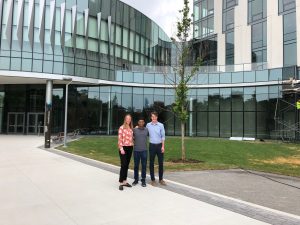 Elara Engineering’s 2019 Summer Internship Program recently concluded with four future engineers gaining critical insight, knowledge, and experience in numerous aspects of the MEP industry. Developed to ensure that interns become fully immersed in a variety of project types at various stages of their lifecycle, all four college students supported Elara’s multidisciplinary engineering design teams from May to August of this year.
Elara Engineering’s 2019 Summer Internship Program recently concluded with four future engineers gaining critical insight, knowledge, and experience in numerous aspects of the MEP industry. Developed to ensure that interns become fully immersed in a variety of project types at various stages of their lifecycle, all four college students supported Elara’s multidisciplinary engineering design teams from May to August of this year.
Over the course of the 2019 summer, Elara’s interns performed field surveys to document existing site conditions, assisted in the development of company drawing standards, utilized both AutoCAD and Revit to support the preparation of engineering drawings, executed basic engineering calculations, and worked directly with Elara’s engineers to meet project deadlines. The Summer Internship Program also included a series of Lunch-and-Learns presented by Elara Principals and managers for the interns to learn about the company’s history and service offerings, gain 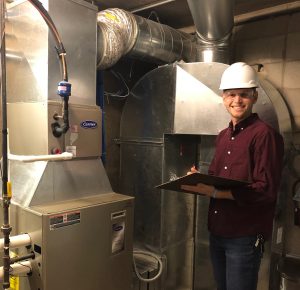 insight into the MEPFPIT systems design process and potential career paths, and discuss numerous innovative projects completed by the firm. At the conclusion of the Summer Internship Program, the interns toured the University of Illinois at Chicago’s newly constructed Academic and Residential Complex to review the innovative design strategies implemented by Elara and to gain further exposure to energy efficient systems in operation.
insight into the MEPFPIT systems design process and potential career paths, and discuss numerous innovative projects completed by the firm. At the conclusion of the Summer Internship Program, the interns toured the University of Illinois at Chicago’s newly constructed Academic and Residential Complex to review the innovative design strategies implemented by Elara and to gain further exposure to energy efficient systems in operation.
During my summer…I had the opportunity to work on multiple engineering teams on a variety of different projects. The internship team gave us very clear directions and equipped us to complete our tasks. I did not have one time this summer where I didn’t have an assignment to tackle or an engineer to check in with. I have learned so much about the construction process and how engineers work with contractors to go from an idea to a physical structure. ~RW
I was able to work alongside practiced engineers while learning various design techniques and practices in the HVAC industry. Everyone was extremely helpful and ensured, over anything else, our understanding of the material. ~ Ben K.
I had an awesome experience at Elara and…it was really cool to be able to work on all different projects throughout the summer. The high school project was particularly interesting for me because I was able to spend time onsite as well as working on the drawings. I have learned so much…. ~ Abby M.
I gained experience in Revit and AutoCAD and I enjoyed attending the Lunch-n-Learns because they provided a deeper discussion on specific topics. This experience also improved my skills working in a team as it showed me how quickly a job can be completed. Every employee brings a different experience to the table so there was always something to learn from them. ~ Rahul M.
Elara is pleased to offer internships for aspiring engineers each summer with additional opportunities to engage students throughout the year. Resumes for internship consideration can be submitted to employment@elaraeng.com.
Illinois' New Retainage Law Now in Effect for Construction Contracts
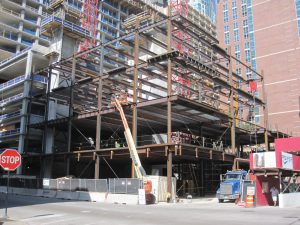 Facility Managers, Building Owners and Contractors take note that on August 20, 2019, Illinois Governor Jay Pritzker signed into law SB 1636, the Contractor Prompt Payment Act.
Facility Managers, Building Owners and Contractors take note that on August 20, 2019, Illinois Governor Jay Pritzker signed into law SB 1636, the Contractor Prompt Payment Act.
The Act, which became effective the day it was signed has the following requirements:
- A retainage of 10% of the payment may be withheld from a payment under a construction contract prior to the completion of 50% of the contract.
- When a construction contract is 50% complete, retainage withheld must be reduced so that no more than 5% is held.
- It further provides that after 50% of the construction contract is completed, the amount of retainage for any subsequent payments may not exceed 5%.
These differ from previous requirements and generally accepted contractual standards for construction projects in Illinois which upheld a retainage value of 10% throughout the project construction until substantial completion.
All future contracts and subsequent pay applications and approvals associated with construction projects within Illinois limits must ensure these provisions are upheld.
The full Act can be found here.
Elara Completes UIC Residence Hall/Academic Building Complex for 2019-2020 Academic Year
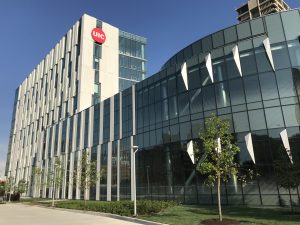 Elara Engineering recently attended the ribbon cutting ceremony of a newly constructed 10-story residence hall and attached 2-story double height academic building at the University of Illinois at Chicago (UIC). As part of a combined Academic and Residential Complex, the new building reflects the University's ongoing role as a driver of innovation and opportunity in Chicago.
Elara Engineering recently attended the ribbon cutting ceremony of a newly constructed 10-story residence hall and attached 2-story double height academic building at the University of Illinois at Chicago (UIC). As part of a combined Academic and Residential Complex, the new building reflects the University's ongoing role as a driver of innovation and opportunity in Chicago.
Elara's Services, Technologies, and LEED Gold Designation
Elara's technical services throughout the entire lifecycle of the project included conceptual planning, schematic design, design development, permit documents, construction documents, bidding assistance, and construction administration. To accommodate dramatically different uses and occupant needs between the academic and residential spaces, Elara's unique design separated the mechanical systems for the residence hall and the academic building; while incorporating shared - but separately 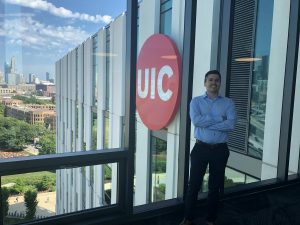 metered - mechanical, electrical and plumbing systems. Specific design technologies include; air-cooled VRF, packaged DOAS, air-cooled VAV system, hot water reheat, condensing boilers, radiant heat, DCV, automated lighting and shade control, and DDC. A LEED Gold rating under LEED v4.0 New Construction is anticipated later in 2019.
metered - mechanical, electrical and plumbing systems. Specific design technologies include; air-cooled VRF, packaged DOAS, air-cooled VAV system, hot water reheat, condensing boilers, radiant heat, DCV, automated lighting and shade control, and DDC. A LEED Gold rating under LEED v4.0 New Construction is anticipated later in 2019.
Academic Building
The 52,700 sq.ft. 2-story academic space contains open circulation lounge spaces, a grand staircase, a student communications stop ("C-Stop") and large auditorium style classrooms designed for student collaboration. The academic building incorporates a glass enclosure with exterior shading.
Residential Tower
The 147,000 square foot residence hall includes 548 beds in traditional two-person dorm rooms and semi-suite style units; and, 16,000 square feet of shared spaces that house a fitness center, laundry facility, and a 10th-floor sky lounge.
"I am thrilled and grateful to be part of the design and construction of this exceptional building for UIC where my passion for energy and building systems began when I was an engineering student here. UIC has been an important contributor to HVAC design and construction in Chicago with a long history of developing talented engineers for our industry. It is truly an amazing experience for me to return to campus as part of Elara's design team for a building that will be identifiable with UIC for years to come."
KCC ATEC Building Construction Completed with $133,048 Awarded in DCEO Funding and LEED Gold Certification
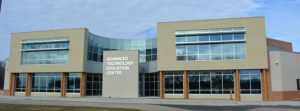 First designed by Elara Engineering in 2009 using Building Information Modeling (BIM) and then delayed significantly by sudden, unexpected State of Illinois budget freezes, final construction of Kankakee Community College’s (KCC) Advanced Technology Education Center (ATEC) was completed earlier in 2019. The ability to maintain project focus over a ten-year period was only possible because of Elara’s, KCC’s, and the lead architect’s commitment to keep the same core team throughout the entire duration of the project. This long-term buy-in to the project’s ultimate completion and success was the critical success factor that made this objective possible.
First designed by Elara Engineering in 2009 using Building Information Modeling (BIM) and then delayed significantly by sudden, unexpected State of Illinois budget freezes, final construction of Kankakee Community College’s (KCC) Advanced Technology Education Center (ATEC) was completed earlier in 2019. The ability to maintain project focus over a ten-year period was only possible because of Elara’s, KCC’s, and the lead architect’s commitment to keep the same core team throughout the entire duration of the project. This long-term buy-in to the project’s ultimate completion and success was the critical success factor that made this objective possible.
State Funding Interruptions
Soon after construction bids were let in 2010, the State of Illinois froze its funding contribution to effectively cancel the project. In 2014, State funding was re-established, and construction bids were reissued. However, immediately after completion of the new building’s concrete footings in 2015, State funding was once again frozen, and the project was suspended for the second time. Finally, in 2018, KCC received the State’s funding portion to allow construction to proceed uninterrupted to completion in 2019.
Budget Success
Even though the building design was ultimately adjusted to accommodate (1) technology advances and opportunities to further enhance system efficiencies, (2) changes in student/faculty use habits within the building, and (3) the unavailability of previously specified equipment (e.g., production of the originally selected roof top AHUs had ceased); the project – even after ten years of inflation and incurred stoppage/restart costs – only required a less than 3.4% change order ten years after the initial design.
Technology Success
Recently awarded LEED Gold designation, ATEC earned a $133,048 U.S. Department of Commerce and Economic Opportunity incentive to alleviate project costs and uses 30% less energy than a baseline ASHRAE 90.1-2004 building. The building features classrooms and functional, green technology laboratories; including wind, solar thermal, solar photovoltaic, electrical simulation and “roof labs” where photovoltaic cells were installed with walk-out access to enable student “hands-on” learning.
The highly innovative design includes:
- Variable ventilation/demand CO2 control
- A dedicated outside air system to provide fresh air at the floor level
- A single pipe loop geothermal/ground source heat pump system for heating and cooling in lieu of a two-pipe geothermal system which reduced pipe and insulation use and material costs
- High-efficiency lighting throughout the building with external and internal shading to help maintain a comfortable learning environment
Although the ATEC project was atypically long due to impacts and hurdles beyond the client’s control, it is representative of the strength of our client relationships and of our unwavering commitment to see any project through to completion – no matter what it takes.
Additional information about this project can be found here.
Navigating Chicago's New Construction Codes
 Elara Engineering is pleased to initiate an ongoing series to inform building developers, owners and managers of the changes, deadlines, and potentially significant impacts from the City of Chicago’s new construction codes. In this first installment, we provide background information on the new construction codes, identify important dates and highlight recent and upcoming code changes.
Elara Engineering is pleased to initiate an ongoing series to inform building developers, owners and managers of the changes, deadlines, and potentially significant impacts from the City of Chicago’s new construction codes. In this first installment, we provide background information on the new construction codes, identify important dates and highlight recent and upcoming code changes.
Background and Goals
According to a May 2019 presentation from the City of Chicago Department of Buildings, the goal of the new construction codes is “to better align the City of Chicago’s construction requirements with up-to-date model codes and standards used in other major US jurisdictions while maintaining longstanding local requirements that are adapted to unique conditions in Chicago.”
Chicago’s 2015-2021 Code Modernization Process – as the effort is called – has been broken down into three phases:
- Phase I, which includes changes to the Conveyance Device Code and Electrical Code, has been completed.
- Phase II, which includes changes to Administrative Provisions, Building Code, Energy Conservation Code, and Rehabilitation Code, is to be completed between 2017 and 2020.
- Phase III, which includes changes to Fire Prevention Code, Fuel Gas Code, Mechanical Code, Plumbing Code, and (specific) Energy Conservation Code enhancements, is to completed between 2019 and 2021.
Electrical Code (Effective 3/1/2019)
Chicago’s new Electrical Code, which became effective on March 1st of this year, includes the following highlights:
- 20 new code articles taken from the National Electric Code (NEC) including six that deal directly with renewable energy
- Upgraded articles dealing with solar-photo voltaic construction to reflect the new technologies
- Lighting load calculation and service disconnect location exceptions
- New requirements for switched lighting
Energy Conservation Code (Effective 6/1/2019)
The revised Illinois Energy Conservation Code, which adopts the 2018 International Energy Conservation Code (IECC) with amendments, is effective on June 1, 2019. The law does not apply to buildings designated “historic” or having “landmark status” (interior and exterior separately), buildings exempt from a local building code, and buildings that do not use either electricity or fossil fuel for comfort conditioning. The new Illinois Energy Conservation Code includes the following highlights:
- IECC now addresses both commercial and residential buildings
- Additional compliance paths have been identified including ASHRAE and performance based
- Code officials are required to approve energy compliance in lieu of testing requirements outlined in the previous IECC
- Lighting and lighting control including daylighting requirements have been updated and clarified
- Mechanical equipment efficiency ratings, minimum airflows and required controls have been updated and clarified
Building Code (Effective 8/1/2020)
A new Building Code will be issued by the International Code Council (ICC) in October of 2019 and will ultimately be adopted by the City of Chicago for mandatory use as of August 1, 2020. A transitional period for implementation of the new building code has been outlined by the City of Chicago as follows:
- Test projects utilizing the new ICC Building Code will be accepted by invitation only for permit applications within the City of Chicago during the Fall of 2019.
- Permit applications within the City of Chicago will have the option to submit according to the new ICC Building Code beginning December 1, 2019.
- Minimum standards for compliance with the new ICC Building Codes will be enacted and enforced by the City of Chicago during the Spring of 2020.
- The new ICC building Codes will be mandatory for all permit applications within the City of Chicago as of August 1, 2020.
Elara's Steve Maze is Keynote Speaker at Olivet Nazarene University
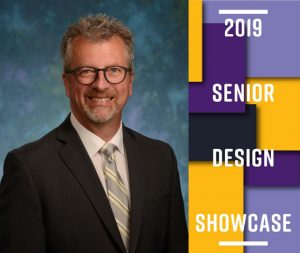 On April 16, 2019, Elara Principal Steve Maze was honored to deliver the keynote speech at a kickoff event celebrating Olivet Nazarene University’s (ONU) Senior Design Showcase held from April 16-18, 2019 on the University’s Bourbonnais, Illinois campus.
On April 16, 2019, Elara Principal Steve Maze was honored to deliver the keynote speech at a kickoff event celebrating Olivet Nazarene University’s (ONU) Senior Design Showcase held from April 16-18, 2019 on the University’s Bourbonnais, Illinois campus.
The Senior Design Showcase for the Martin D. Walker School of Engineering was a 3-day event where Senior-Year project teams, having worked with select industry partners, presented their final products and outcomes from the academic year. In his speech to the department’s Seniors, engineering faculty, university leaders, and project partners; Mr. Maze provided his thoughts regarding his 30-year career in the MEP industry and as founder and owner of Elara Engineering Services, and his insights into the excellent career opportunities for graduating engineers.
ONU’s Martin D. Walker School of Engineering has been accredited since 1998 by the Engineering Accreditation Commission of ABET; a nonprofit, ISO 9001 certified organization that accredits college and university programs in applied and natural science, computing, engineering and engineering technology. ONU’s engineering school has also been recognized by CollegesofDistinction.com for the high standards it sets for students and for its offering of numerous engineering concentrations. Because Elara always seeks out the most qualified individuals to join its team, we are pleased to have on our staff graduates from ONU’s Walker School of Engineering as well as summer interns that are current ONU engineering students.
Additionally, Elara has completed numerous successful projects for ONU, including; the recently constructed Student Life and Recreation Center (SLRC). For the SLRC project, Elara received a total of $366,476 in utility and clean energy incentives to help reduce overall project costs and a project outcome that produced annual energy savings of 2,764,761 kWh with an annual cost saving of $194,133.
R-22 2020 Phase-Out Deadline Fast Approaching
Background
The Montreal Protocol is a global agreement with the goal of phasing out the use and production of Ozone Depleting Substances (ODS), which include hydrochlorofluorocarbons (HCFCs). To meet the goals established by the Montreal Protocol, HCFCs must be phased out by January 1, 2020; and will therefore, no longer be produced or imported into the U.S. after that date.
Although other HCFCs can be sometimes be found in currently used refrigeration equipment, the most common HCFC by far is HCFC-22 or R-22. This refrigerant is used in existing air conditioners and refrigeration equipment including unitary air conditioners, cold storage, retail food refrigeration equipment, chillers, and industrial process refrigeration.
Many recall the first step of the HCFC phase out, which occurred on January 1, 2010 and resulted in the production of R-22 to be significantly reduced. Since the initial phase out, the cost of R-22, and therefore the cost of maintaining equipment using R-22, has become increasingly expensive. After the upcoming phase out, only reclaimed or stockpiled R-22 can be used for maintenance of R-22 refrigeration equipment. It is expected that the cost of R-22 will significantly increase with the latest phase due to limited and dwindling supplies.
Options for Building Owners and Managers
With potentially many pieces of air conditioning equipment under their care and responsibility, the upcoming R-22 phase-out deadline means that building owners and managers need to establish a viable, common-sense course of action to pursue. Several options are available.
- DO NOTHING NOW AND WAIT. If a unit breaks after January 2020, the repair may be cost prohibitive due to the cost of R-22. If it happens in 2019, a decision will have to be made to replace it or to invest in a repair.
- RETROFIT OLDER SYSTEMS TO USE A NEW REFRIGERANT. In some cases, equipment owners can invest in a retrofit that allows existing equipment to use certain newer refrigerants. Because this option will not be possible for all systems, an analysis will be needed to determine its technical and financial viability.
- REPLACE PROACTIVELY. Although the upfront cost/investment can be a hurdle, especially if multiple systems need to be replaced prior to the R-22 phase-out deadline; proactive replacement could be the most cost-effective alternative in the long run. Equipment owners can take advantage of current tax breaks and utility-sponsored incentive programs to potentially reduce HVAC equipment and installation costs.
Options Guidance and Cost Reduction Opportunities
With expertise in energy audits and studies, master planning, engineering design, equipment identification and selection; Elara Engineering is well-positioned to identify, evaluate, and pursue a technically and financially sound R-22 phase-out option. In addition, having procured a cumulative total of over $5MM in incentives from ComEd, Peoples Gas, and Nicor to help offset costs associated with the installation of energy efficient improvements, Elara can assist clients, when combined with applicable tax breaks, minimize R-22 phase-out costs as much as possible.
Elara Principal Don McLauchlan Delivers Presentation on the Economic Benefits of Sustainability at Marist College
As part of Marist College’s 12th Annual Sustainability Week held from October 22-25, 2018, Elara Principal Don McLauchlan was invited to present the Economic Benefits of Sustainability in support of the week’s theme: “Marist Sustainability: From Strategic Goals to Sustainable Action.”
Marist College, located on the Hudson River in 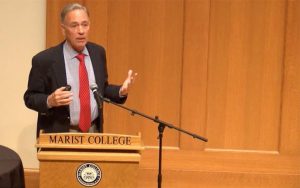 Poughkeepsie, New York, has – according to a message from its President, David Yellen – “been a longtime leader in preserving and protecting the Hudson River valley” and believes that “colleges and universities must take the lead in educating people about the issues related to sustainability, as well as setting an example of environmental stewardship.” Don McLauchlan, with his career-long passion for energy efficiency, continues to be -- along with the entire Elara Engineering team – a strong catalyst for innovative engineering solutions that deliver sustainable energy efficiencies that minimize environmental impacts and save money.
Poughkeepsie, New York, has – according to a message from its President, David Yellen – “been a longtime leader in preserving and protecting the Hudson River valley” and believes that “colleges and universities must take the lead in educating people about the issues related to sustainability, as well as setting an example of environmental stewardship.” Don McLauchlan, with his career-long passion for energy efficiency, continues to be -- along with the entire Elara Engineering team – a strong catalyst for innovative engineering solutions that deliver sustainable energy efficiencies that minimize environmental impacts and save money.
Don’s presentation and subsequent Q&A session covered a wide range of topics. To view some of what he said, just click on the following video clips:
Reduce Energy for No Increase in Cost
https://www.youtube.com/watch?v=SXz4XvH2S8I
1 Watt Saving at the Room Level Saves 4 Watts at the Source
https://www.youtube.com/watch?v=gQhlPPY25ag
Net Zero Energy Buildings
https://www.youtube.com/watch?v=brOcj0BN2v4
Radiant Heating and Cooling
https://www.youtube.com/watch?v=fbisANFdPEc
Reuse of Piping for Retrofits
https://www.youtube.com/watch?v=EHsJQKOMmXk
2018 - A Year of Continued Success for Elara Engineering
Elara Engineering is pleased to announce to its valued clients, employees, and vendors that – in 2018 -- we have continued to build upon our previous successes.
From the continued design of new technologies such as Variable Flow Refrigerant to Riser Pipe Replacement Projects to the design of large Emergency Backup Power Systems, our dedicated and talented team continues to achieve energy efficiencies through constructible designs that minimize the carbon footprint on the environment, save money, and increase asset value.
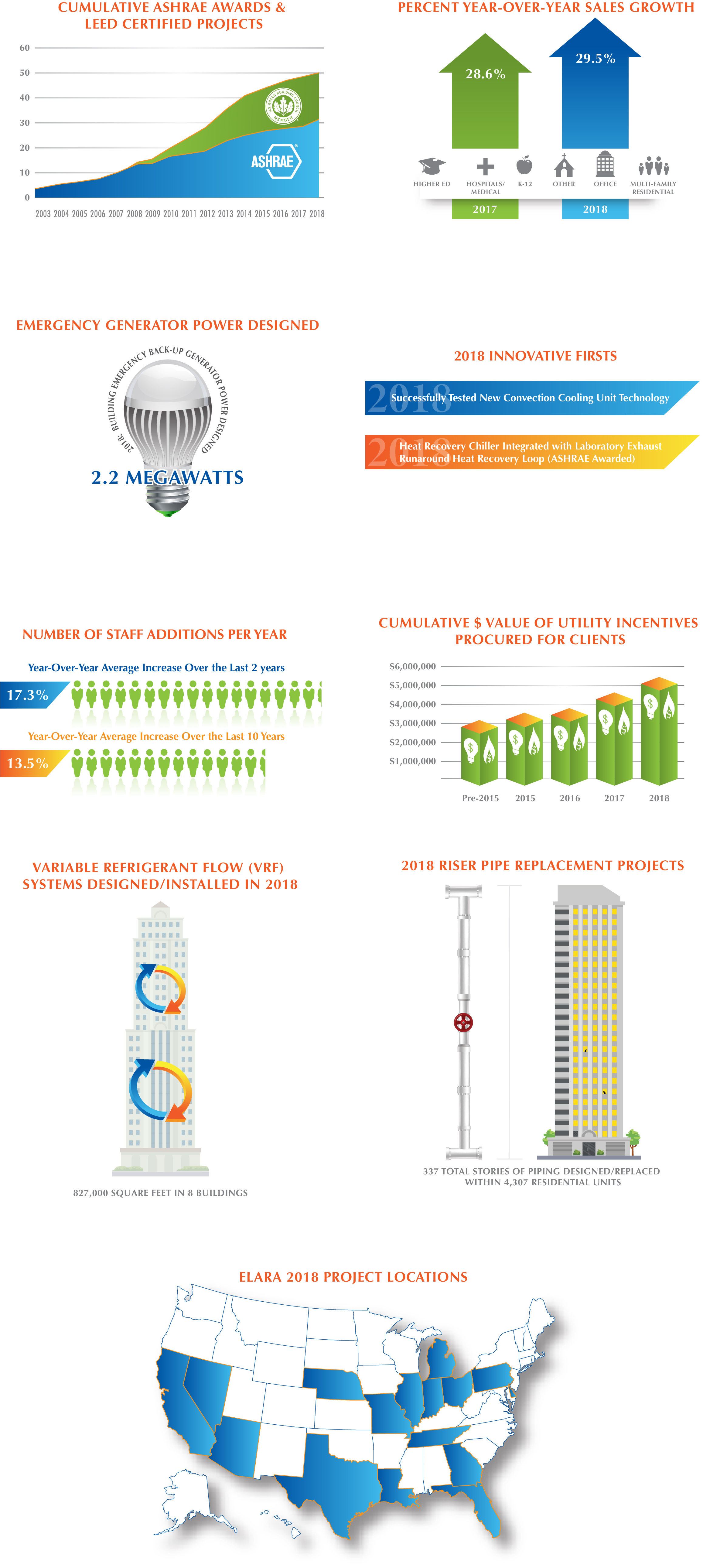
Elara Earns 23rd and 24th Excellence in Engineering Awards
On December 4, 2018, Elara Engineering received two 2018 Illinois Chapter ASHRAE Excellence in Engineering Awards.
The first award recognizes Elara’s sustainable design of energy efficient mechanical systems and infrastructure at the Indian Trails Public Library in Wheeling, Illinois while the second recognizes our team’s innovative design that improved energy efficiency at Loyola University Chicago’s (LUC) Quinlan Life Sciences Building; a continuously operated, energy intensive laboratory building.
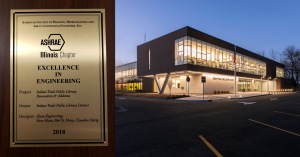 Indian Trails Public Library
Indian Trails Public Library
- Renovated building with new addition uses approximately 40-50% less energy than typical library building.
- New energy efficient mechanical systems and infrastructure incorporate a geothermal heating and cooling system that utilizes water source heat pumps.
- $100,000 EBSCO grant awarded for solar array installation costs – selected from 90 grant submissions from 15 countries.
- Additional details about this project can be found here.
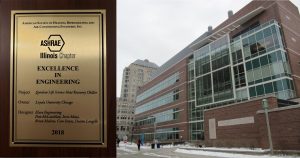 LUC Quinlan Life Sciences Building
LUC Quinlan Life Sciences Building
- Practical design that generates approximately $62,000 in annual energy cost savings with a quick ROI.
- Design integrated two heat recovery systems to enable year-round heat energy recovery and eliminated heat rejection equipment to reduce implementation costs.
- Reduced load of campus’ central chilled water plant to provide additional capacity for future buildings.
- Additional details about this project can be found here.
Elara congratulates its dedicated and talented project teams on their achievement and recognition by their peers in the Illinois ASHRAE Chapter.
Elara's Don McLauchlan Receives UIC Engineering 2018 Outstanding Achievement Award
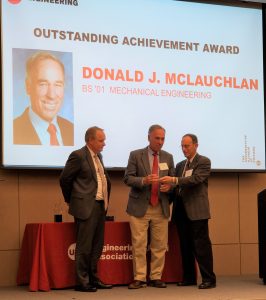 Elara Engineering is pleased to announce that on November 7, 2018 at the University of Illinois-Chicago (UIC) College of Engineering’s Alumni Awards Dinner, Don McLauchlan was awarded a 2018 UIC Engineering Outstanding Achievement Award. Don holds a Bachelor of Science degree in Mechanical Engineering from UIC and is a founder and principal of Elara Engineering, Inc.
Elara Engineering is pleased to announce that on November 7, 2018 at the University of Illinois-Chicago (UIC) College of Engineering’s Alumni Awards Dinner, Don McLauchlan was awarded a 2018 UIC Engineering Outstanding Achievement Award. Don holds a Bachelor of Science degree in Mechanical Engineering from UIC and is a founder and principal of Elara Engineering, Inc.
As described by UIC for the awards event, Don has over 35 years of experience in MEP design, construction, and commissioning and focuses on energy efficient design in the building environment; including, new construction, major renovations, problem-solving, green buildings, and fully integrated sustainable systems. He has led engineering teams on projects for large commercial buildings, schools, universities, and hospitals; among others that have earned 21 first-place Illinois ASHRAE Excellence in Engineering Awards, three first-place Midwest Regional ASHRAE Technology Awards, two International Society ASHRAE Technology Awards, a Green Design Award from the Institute of Real Estate Management, and a Green Innovation Emerald Award from the United States Green Building Council.
As a licensed professional engineer in several states, Don is a certified energy manager and LEED-Accredited Professional. He has authored several technical articles for the ASHRAE Journal and other trade journals and has been a speaker at numerous industry conferences.
Elara Engineering is proud to congratulate Don for his 2018 UIC Outstanding Achievement Award and for his infectious passion, guiding leadership, industry involvement, commitment to client service, and a career devoted to energy conservation and innovative design.
Elara Decentralizes Steam Plant Serving Northwestern University’s Downtown Chicago Campus
Elara Engineering recently completed the first of  two phases of engineering to decentralize an aging steam plant serving Northwestern University’s downtown Chicago campus through the design and installation of several distributed hot water, medium-pressure steam, and low-pressure steam boiler plants.
two phases of engineering to decentralize an aging steam plant serving Northwestern University’s downtown Chicago campus through the design and installation of several distributed hot water, medium-pressure steam, and low-pressure steam boiler plants.
Through its assessment and investigation to define the project scope and objectives, Elara determined conversion to hot water heating via distributed plants presented opportunities for energy and maintenance savings while the remaining steam production could be focused specifically on humidification and process loads. 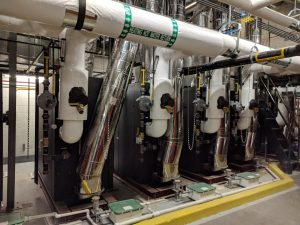 Locating small, high pressure process boilers in each building near process users allows for a significant reduction in energy and maintenance while limiting the low-pressure steam plant to winter usage allows the plant to be shut off during the summer. This design approach reduces energy costs but also allows for maintenance to occur during the summer when the boilers are not operational. Most heating, re-heat, and domestic hot water loads are served from condensing hot water boilers to maximize energy savings. Other identified benefits of decentralizing campus heating include updating a large portion of existing infrastructure and freeing up additional land for future development in a highly urbanized environment.
Locating small, high pressure process boilers in each building near process users allows for a significant reduction in energy and maintenance while limiting the low-pressure steam plant to winter usage allows the plant to be shut off during the summer. This design approach reduces energy costs but also allows for maintenance to occur during the summer when the boilers are not operational. Most heating, re-heat, and domestic hot water loads are served from condensing hot water boilers to maximize energy savings. Other identified benefits of decentralizing campus heating include updating a large portion of existing infrastructure and freeing up additional land for future development in a highly urbanized environment.
The first phase of the project – completed in Fall of 2018 -- addressed six campus buildings that primarily house classroom and office spaces and that do not require process steam. With Elara’s design, Northwestern University’s Abbott Hall, 345 E. Superior building, Rubloff Building, Levy Mayer Hall, McCormick Hall, and Wieboldt Hall are now supported by three new boiler plants. The plants in Abbott Hall and 345 E. Superior are stand-alone systems dedicated to supporting the building they are housed within; whereas, the Rubloff Building boiler plant supports Levy Mayer Hall, McCormick Hall, Wieboldt Hall, and the Rubloff Building itself.
In addition to the development of permit documents, contractor selection assistance, construction services, and functional testing; Elara reviewed applicable local incentive programs, prepared applications, and facilitated the approval process for selected incentives. To date, $129,952 of incentives have been procured for this $5.9M project.
Elara Guides Design of USGBC Certified Passive House (PHIUS+) and LEED Platinum Multifamily Midrise Supportive Building
To support the initiatives of Heartland Housing, Inc --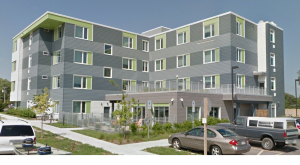 a division of the Heartland Alliance (Chicago, IL) and a developer/manager of sustainable, innovative and high-quality affordable housing for at-risk populations -- Elara provided advice, planning, and direction to the entire project team regarding MEPFP and sustainable features, including solar domestic hot water and geothermal heating and cooling.
a division of the Heartland Alliance (Chicago, IL) and a developer/manager of sustainable, innovative and high-quality affordable housing for at-risk populations -- Elara provided advice, planning, and direction to the entire project team regarding MEPFP and sustainable features, including solar domestic hot water and geothermal heating and cooling.
Rethke Terrace in Madison, WI is a 36,000 ft², 4-story, newly constructed supportive housing facility with 60 studio, single-occupant units serving the formerly homeless or those at risk of homelessness. The property has 5,000 ft² of common area and office space for property management and four case workers, assembly space, a computer room, a library/quiet room, a fitness room, and a commercial kitchen for residents and the neighborhood.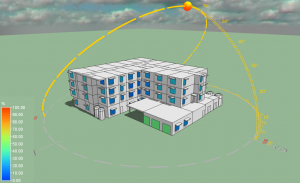
With Elara's efforts, Rethke Terrace achieved Passive House certification and a LEED Platinum designation for Homes (Midrise). Contributing design elements include wall assembly features with advanced framing details and an air-tight envelope, window heights and placement that maximize natural day-lighting, energy efficient lighting design, energy recovery ventilators, Variable Refrigerant Flow (VRF) heating and cooling systems to provide individual comfort control in units, occupancy sensors, window switches, kWh tracking, and remote building management.
Elara provided conceptual/pre-schematic design, schematic design, design development, bidding, and construction observation services. To support the project's early planning phases, Elara performed energy modeling and building optimization based on numerous interacting effects; evaluated the most cost-effective building design; explored net-zero energy opportunities; and optimized lighting design and controls, including a detailed light level analysis, daylighting, occupancy control, and layouts to minimize energy while maximizing occupant satisfaction. A renewable energy analysis was also completed that evaluated multiple options, including geothermal, and their performance. Elara also evaluated plumbing heat recovery and rain water retention/reuse.
The HVAC system ultimately selected due to Elara's work maximized energy efficiency and savings and minimized cost with respect to building envelope design.
Elara Summer Interns Reflect on Valuable Experience
Elara Engineering’s 2018 Summer Internship 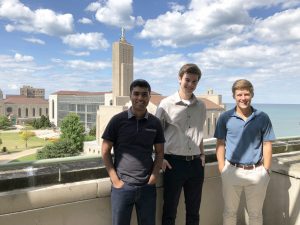 Program concluded with the participation of three aspiring engineers at varying stages of their undergraduate careers. Developed to expose interns to numerous aspects of the MEPFPIT design industry, Elara’s program had all three individuals fully immersed and supporting multidisciplinary engineering design work from May to August.
Program concluded with the participation of three aspiring engineers at varying stages of their undergraduate careers. Developed to expose interns to numerous aspects of the MEPFPIT design industry, Elara’s program had all three individuals fully immersed and supporting multidisciplinary engineering design work from May to August.
The intern team reviewed existing building drawings and drafted them to scale, supported in the preparation of engineering drawings utilizing both CAD and Revit, performed field visits to document existing conditions and assisted in basic engineering calculations. Throughout the summer, the interns also attended a series of lunch-and-learns presented by Elara Principal and Project Engineer teams to gain different perspectives on various roles within engineering, learn about the company’s history and discuss technical advances taking place in the industry. The internship concluded with a tour of the Loyola University Chicago’s Lakeshore Campus to review the many innovative projects that Elara has completed throughout the campus and gain further exposure to energy efficient systems in operation. When asked about their internship experience, Elara’s three very talented interns offered the following:
“This summer I was able to work alongside experienced engineers and learn more about ongoing projects at Elara. Everyone I worked with was very helpful and spent time to explain to me the technical aspects of the project. Having that background knowledge going into an assignment helped me develop a good understanding of basic practices involved in the industry.” ~ Ben K.
“…another favorite thing was going onsite and learning new systems. It not only helped to connect the dots from CAD to job site, but it also gave me an opportunity to meet other engineers working on the same project.” ~ Rahul M.
“My favorite thing about the company was the sense of community that everyone had. What I mean by that is how the people here care about one another when it comes to the work everyone is doing. Everyone I worked with was able to stop what they were doing and provide me with the answers I needed. I was very impressed with how much I was encouraged to actually learn about what I was doing.” ~ Bo M.
Elara is pleased to offer internships for aspiring engineers each summer with additional opportunities to engage students throughout the year. Resumes for internship consideration can be submitted to employment@elaraeng.com.
Loyola University Chicago Ranked 5th Most Eco-Friendly College in U.S.
Elara Engineering is pleased to announce that Loyola 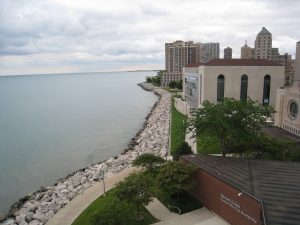 University Chicago (LUC) has been ranked by College Magazine as the 5th most eco-friendly college campus in the United States. Congratulations!
University Chicago (LUC) has been ranked by College Magazine as the 5th most eco-friendly college campus in the United States. Congratulations!
According to College Magazine’s article (found at www.collegemagazine.com), the ranked schools and their students work to reduce their carbon footprint on a campus-scale. For example, the top ten schools make the most of their resources by providing easy access to recycling, using renewable energy, committing to zero waste at events, having great Environmental Science programs and student run eco-clubs, and holding high standards for environmental sustainability.
The article specifically cites LUC’s zero waste biodiesel production process, rainwater utilization, multipurpose soap, and successful student-lead campaigns to ban water bottles, the use of plastic bags, and to get the University’s administration to take a stand in support of a price on carbon. Students have also created clubs such as the Student Environmental Alliance and the Growers Guild. Additionally, the University offers six majors within its Environmental Department: Environmental Science, Environmental Policy, Environmental Public Health, Environmental Studies, Conservation and Restoration Ecology, and Food Systems and Sustainable Agriculture.
Elara is honored for the many opportunities it has had during its ongoing partnership with Loyola University Chicago to advance the school’s commitment to an energy efficient infrastructure. Completed projects to date have earned an Energy Star Award, a LEED Gold or Silver Designation, a USGBC Emerald Green Innovation Award, and numerous ASHRAE awards at the Chapter, Regional and International level.
Congratulations again to Loyola University Chicago on its recognition as one of the most eco-friendly college campuses in the country.
Elara Replaces Galvanized Domestic Water Piping Throughout Occupied 42-Story Condominium Building
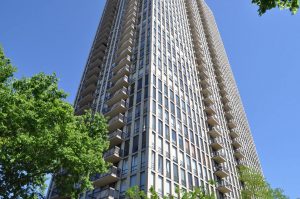 Elara Engineering recently completed the engineering design and coordinated construction effort to replace leaking galvanized steel domestic water piping with new copper piping for an entire 42-story residential building, while fully occupied. The large-scale project – completed under budget and ahead of schedule included common areas, hot and cold supply risers, condo unit branch piping, hot water return risers, and express risers (a total of 17 risers).
Elara Engineering recently completed the engineering design and coordinated construction effort to replace leaking galvanized steel domestic water piping with new copper piping for an entire 42-story residential building, while fully occupied. The large-scale project – completed under budget and ahead of schedule included common areas, hot and cold supply risers, condo unit branch piping, hot water return risers, and express risers (a total of 17 risers).
Key project factors included creative scheduling and work coordination to balance project speed and cost while minimizing unit occupant disruptions. Working within these parameters, the project maintained water service to each unit at the end of each work day while impacting each unit for no more than 20 consecutive business days. Elara worked closely with contractors, building staff, the condominium association board and building occupants to achieve a successful project.
The building’s risers are divided into two vertical zones that span Floors 1-22 and 23-42. One of the risers consists of express vertical risers to deliver domestic cold and hot water from the basement directly to the ceiling of the 22nd Floor, and horizontally to risers that serve Floors 23-42. Two other risers serve the high and low zone and return hot water to the domestic hot water heaters located in the basement.
Elara recommended, further customized and then executed a three-phased project approach for this building.
- Phase 1: An initial study was performed to identify scope, major obstacles to the project, potential project phasing, and cost estimate.
- Phase 2: Replaced horizontal distribution piping, isolation valves, and an initial riser.
- Phase 3 Replaced remaining piping throughout the building utilizing the knowledge obtained in the previous phases.
More information about this project and other Elara projects can be found here.
Elara Procures Over $800K in Incentives for clients
 its clients $820,212 in incentives from Commonwealth Edison, Peoples Gas and Nicor to help offset costs associated with the installation of energy efficiency improvements. This represents Elara's highest annual total to date; although, current trends indicate that procured incentives in 2018 may be even higher. Elara has been actively involved in various utility incentive programs since 2009 and has successfully procured $4,649,228 since then for its clients.ComEd’s Smart Ideas Program, the Chicagoland Natural Gas Savings Program from Peoples Gas and Nicor’s EnergySMART Program all offer non-residential Illinois customers a wide range of incentives for the installation of energy efficiency improvements and the purchase of energy efficient equipment. Incentives are received after a detailed application process and successful completion of the designed project.
its clients $820,212 in incentives from Commonwealth Edison, Peoples Gas and Nicor to help offset costs associated with the installation of energy efficiency improvements. This represents Elara's highest annual total to date; although, current trends indicate that procured incentives in 2018 may be even higher. Elara has been actively involved in various utility incentive programs since 2009 and has successfully procured $4,649,228 since then for its clients.ComEd’s Smart Ideas Program, the Chicagoland Natural Gas Savings Program from Peoples Gas and Nicor’s EnergySMART Program all offer non-residential Illinois customers a wide range of incentives for the installation of energy efficiency improvements and the purchase of energy efficient equipment. Incentives are received after a detailed application process and successful completion of the designed project.
Lead by Elara’s Incentive Procurement Team and working with our clients and program representatives during the assessment and design phase of an energy project; Elara checks project and equipment eligibility, develops, submits and tracks the pre-approval application, completes the project design, reviews the installation of selected equipment, and submits the final application once the project is complete, including required measurement and verification data for custom projects.
Through its relationships with program representatives and participation in incentive program round tables and conferences, Elara has the ability to maximize the incentive amounts for our clients and streamline the incentive application and approval process. As of June 2018, Elara has already received approval for $206K in incentives with another $705K in the pipeline, bringing the potential total of procured incentives from ComEd, Peoples Gas and Nicor for this year to $911K.
Elara Reduces Utility Costs by $116,000 for New Orleans Hotel
Based on a recommendation from Elara Engineering’s 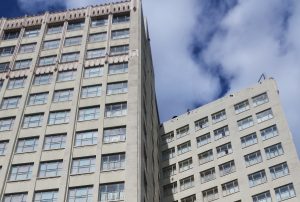 Energy Audit and HVAC/Mechanical Systems Assessment of the Renaissance Pere Marquette Hotel, Elara recently completed a chiller plant replacement and chiller heat recovery implementation project that reduced utility costs by $94,000 within the first 10 months of operation (projected at $116,000 annually). Elara’s assessment identified additional improvement opportunities with a potential to reduce the hotel’s operating costs up to an additional estimated $125,000 per year.
Energy Audit and HVAC/Mechanical Systems Assessment of the Renaissance Pere Marquette Hotel, Elara recently completed a chiller plant replacement and chiller heat recovery implementation project that reduced utility costs by $94,000 within the first 10 months of operation (projected at $116,000 annually). Elara’s assessment identified additional improvement opportunities with a potential to reduce the hotel’s operating costs up to an additional estimated $125,000 per year.
The Pere Marquette Hotel, an 18-story luxury hotel located in New Orleans’ historic French Quarter was originally constructed in 1925, renovated in 2001, and underwent repairs to the base building after Hurricane Katrina in 2005. The property has 275 guest rooms, restaurant, café, fitness center, banquet and conference facilities, offices, and a parking garage.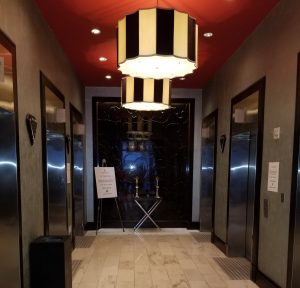
Due to costly, repeated issues with compressor failures, an upgrade of the hotel’s existing chilled water plant was identified as a priority project within Elara’s assessment report. Upon approval from the owner to implement the first of its recommendations, Elara;
- Designed and replaced three existing air-cooled rooftop chillers with two cooling-only chillers and one heat recovery chiller to preheat the domestic hot water using waste heat while improving the chiller’s efficiency,
- Designed the replacement in phases to minimize building systems downtime and allow the hotel to remain operational,
- Converted one of the building’s existing three domestic hot water storage tanks to a preheat tank associated with the new heat recovery chiller, and
- Installed a new heat exchanger and pump along with associated controls.
Elara Engineering Introduces New Collaborative Workspace
As part of Elara Engineering’s ongoing strategy to 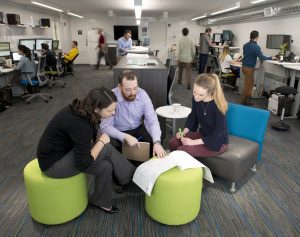 identify the best possible technologies, processes, training and work environment to continuously generate innovative, cutting-edge designs that improve the functionality of both new and existing buildings, Elara recently reconfigured one of its workspaces to further enhance staff communication, collaboration, and teamwork.
identify the best possible technologies, processes, training and work environment to continuously generate innovative, cutting-edge designs that improve the functionality of both new and existing buildings, Elara recently reconfigured one of its workspaces to further enhance staff communication, collaboration, and teamwork.
Defined by its guiding principles of Big Picture Thinking, Practical Approach, and Sustainable Designs, Elara has created a workspace that gives its talented and dedicated professionals the freedom and flexibility – including the opportunity to easily work as a group, when desired -- to analyze, problem solve, and innovate in a comfortable work environment. With its open-office layout, dedicated small group meeting spaces, open table-tops for group discussions around client plans and drawings, writeable walls, and adaptive sit-stand desks for increased comfort; communication channels are shortened, project issues and opportunities are identified and resolved faster, and project quality and efficiency are improved.
Elara Engineers Design and Facilitate Hands-On Experiment for Loyola University Chicago Engineering Course
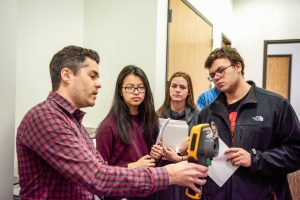
Using an energy-efficient, radiant heating/cooling technology that Elara designed for Loyola University Chicago’s Cuneo Hall (a Gold LEED-Certified building that was in the Top 5% of U.S. energy-efficient classroom buildings when it opened in 2012), Loyola’s Dr. Gail Baura, PhD; Director of Engineering Science and Dr. Jason Streeter, PhD; Clinical Assistant Professor recently facilitated an Elara developed learning experience for a group of engineering students (ENGR 201, Experiential Engineering).
Created by Elara’s Don McLauchlan and additionally facilitated by Brian Malone, Associate Principal; the experiment investigated radiant technology that incorporates several BEKA capillary tube mats installed in groups in each of Cuneo Hall’s classrooms to achieve the following learning objectives:
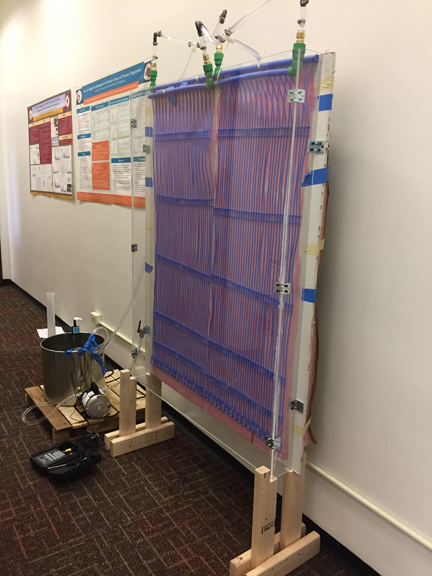
- How to apply the First Law of Thermodynamics,
- How to use control volumes to analyze systems, and
- How to estimate radiative heat transfer.
The small-group, hands-on experiment is consistent with the objectives of Loyola’s Engineering Science Program that emphasize active learning to facilitate student engagement and engineering retention. Elara was honored and appreciated the opportunity to provide its expertise and insight for tomorrow’s engineering professionals.
Don McLauchlan, PE, CEM, LEED AP, is a Principal of Elara Engineering and a member of the Engineering Science Industrial Advisory Board for Loyola University Chicago’s Engineering Science Program. Additional information about Loyola’s Engineering Science Program can be found here.
Elara Earns 22nd Excellence in Engineering Award
22nd Excellence in Engineering Award
In December of 2017, Elara Engineering received an Illinois Chapter ASHRAE Excellence in Engineering Award for its energy retrofit project at The Residence at Water Tower Place in Chicago’s Streeterville neighborhood (180 East Pearson Street). This latest recognition represents Elara’s 22nd Chapter-Level ASHRAE award since the company’s inception in 2001.
The innovative project, further highlighted in the Autumn Issue of Chicagoland Buildings & Environment (access the article) and led by Don McLauchlan and Ryan Hoff, reduced energy costs by 50% and improved occupant comfort through a design approach that re-established centralized humidification and improved building pressurization. Additional details about the project can be found here.
Mechanical Upgrade of Library Protects Rare Book Collection and Lowers Energy Bills
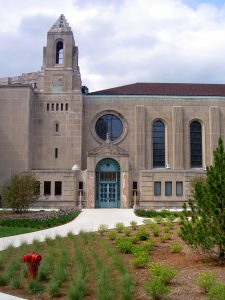 Elara Engineering has completed a mechanical, electrical, and fire alarm retrofit of Loyola University’s historic Cudahy Library located on its Lake Shore Campus in Chicago, Illinois.
Elara Engineering has completed a mechanical, electrical, and fire alarm retrofit of Loyola University’s historic Cudahy Library located on its Lake Shore Campus in Chicago, Illinois.
The MEP upgrade of the 3-story building, originally constructed in the 1920s, will dramatically reduce energy costs while installed systems to control temperature and humidity will help protect and further preserve the life expectancy of the 12,600+ rare books housed in the Archives and Special Collections department of the Library. The prized collection reflects the liberal arts foundation of Loyola University in the areas of Philosophy, Religion, History and Geography, and Language and Literature.
To achieve the project’s objectives, Elara:
- Converted the building from costly electric resistance heating to hot water heating fed by the Campus’ high efficiency hot water plant.
- Replaced aged and noisy Air Handling Units (AHUs) that provided insufficient humidity control with new custom consolidated VAV and heat pump systems which incorporated energy recovery, including the innovative installation of new fan powered boxes with hot water reheat coils designed to circulate chilled water during cooling to act, in essence; as active chilled beams.
- Installed a new heat pump system with a fluid cooler for the Library’s book stack area and waterside economizer for fan powered boxes via heat exchanger.
- Replaced existing pneumatic control system with a new state-of-the-art Direct Digital Control building automation system tied to the Campus’ network.
- Upgraded the building’s main electrical panel and fire alarm system and modified the electrical infrastructure to support the new and upgraded mechanical systems.

Maine Township High School District 207 to Receive $260,270 in Utility Incentives for Central Plant Upgrades
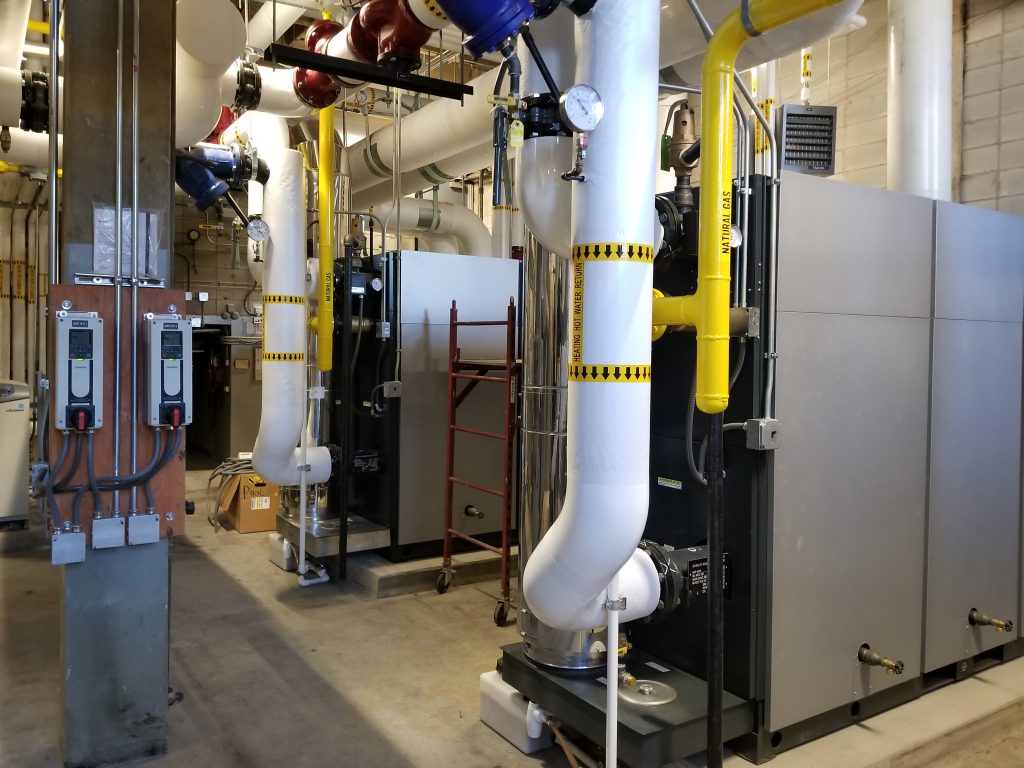 As a result of Elara’s design to replace and upgrade the existing central plants serving Maine South High School and Maine West High School, Maine Township High School District 207 has been approved to receive $260,270 in incentive funding due to the demonstrated energy efficiency of the new central plants.
As a result of Elara’s design to replace and upgrade the existing central plants serving Maine South High School and Maine West High School, Maine Township High School District 207 has been approved to receive $260,270 in incentive funding due to the demonstrated energy efficiency of the new central plants.
Through the initial stages of a master plan for the entire School District, Elara identified the opportunity to convert the existing inefficient heating system serving Maine West High School from low pressure steam to hot water heating fed by a high-efficiency condensing hot water boiler plant and to install a new dedicated domestic hot water and pool heating plant. This work included replacement of the existing steam absorption chillers with new high-efficiency electric chillers, upgrade of ten air handling units, and the elimination of nine heat exchangers.
Elara similarly identified the opportunity to replace the existing high temperature/high-pressure hot water boiler plant at Maine South with a new high-efficiency condensing boiler heating plant and to install new dedicated domestic hot water and pool heating plant. This work included the elimination of ten heat exchangers and the consolidation of the space heating boiler plants. Also as part of the central plant upgrade project, new state-of-the-art direct digital control building automation systems were also installed to replace existing pneumatic controls at both high schools.
Additional benefits of Elara’s central plant upgrade design include replacing aged equipment in need of repair with new higher efficiency equipment with lower operating costs, reducing maintenance through the elimination of equipment, and improving comfort through state-of-the-art controls. The projects were completed on-time and under budget with $260,270 ($159,639 for natural gas; $100,631 for electric) in incentive funding approved through local utility companies.
Elara Designs Geothermal Heating & Cooling System for Eastland Elementary School
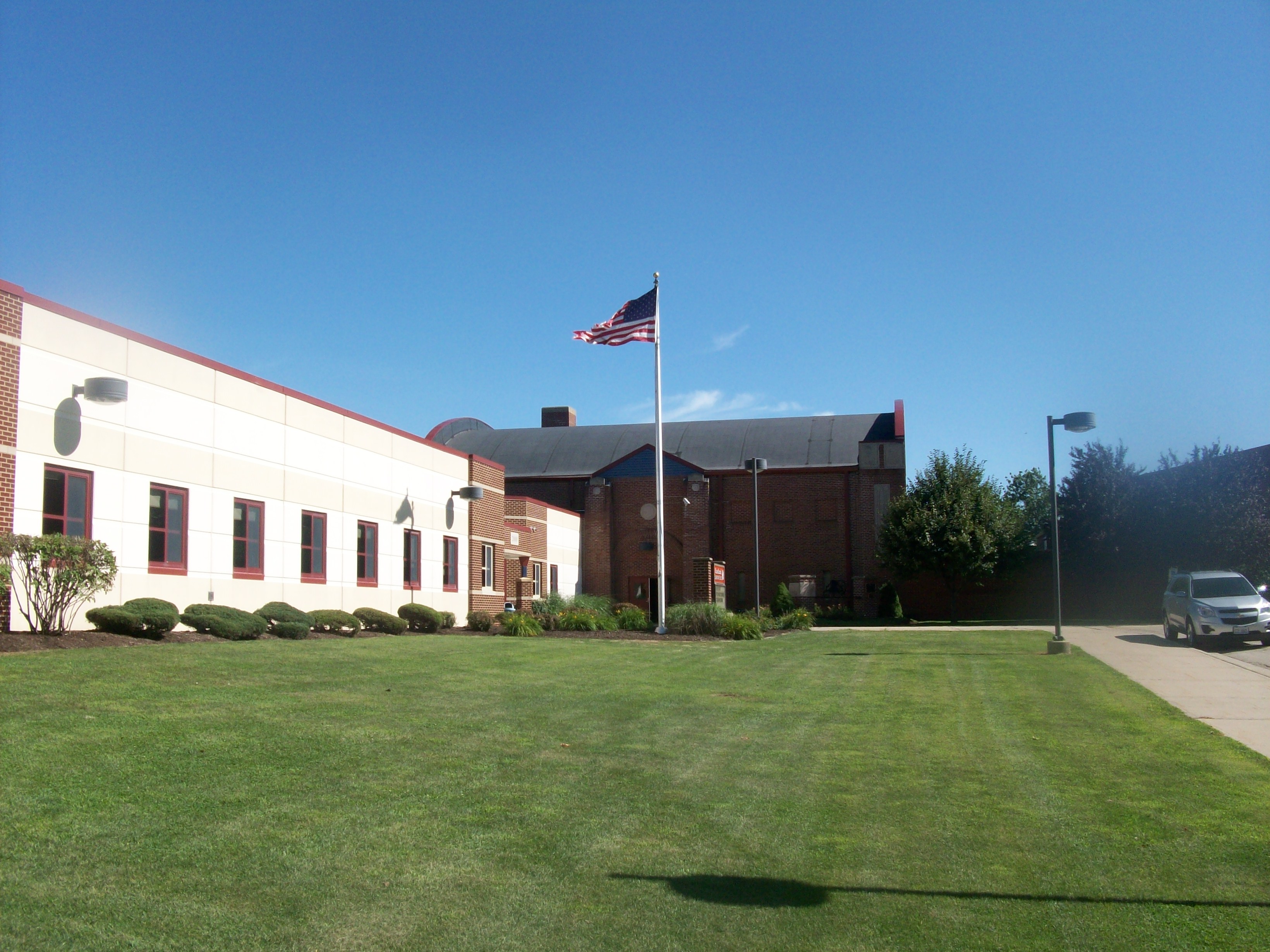 As part of its heating and ventilation system evaluation for Eastland Elementary School for Community Unified School District (CUSD) 308 in Lanark, Illinois, together with Richard L. Johnson Associates Architects, Elara recommended improvements to the school’s existing HVAC system to address aging equipment, increase energy efficiency, and enhance occupant comfort. One improvement strategy included the design and installation of a Geothermal Heat Pump System for centralized space heating and cooling for the building.
As part of its heating and ventilation system evaluation for Eastland Elementary School for Community Unified School District (CUSD) 308 in Lanark, Illinois, together with Richard L. Johnson Associates Architects, Elara recommended improvements to the school’s existing HVAC system to address aging equipment, increase energy efficiency, and enhance occupant comfort. One improvement strategy included the design and installation of a Geothermal Heat Pump System for centralized space heating and cooling for the building.
The geothermal system designed by Elara was installed for an incremental cost of less than 10% of that to install a conventional heating and cooling system. Additionally, this environmentally-friendly approach is more energy efficient and eliminates future costs to replace central boiler and chiller plants approximately every 20 years. The system’s geothermal field, with its 36, 450-foot deep vertical wells is anticipated to last at least 50 years, with heat pump equipment replaced according to a traditional schedule.
For the system installation, a single pipe geothermal condenser water loop was utilized to serve the classroom heat pumps and to save material and labor costs of pipes routed through an existing utility tunnel. Elara also re-used two existing mezzanines above the gymnasium’s stage area to house new heat pump air handling equipment. Once Elara unified the HVAC systems for the building (which were previously disjointed due to numerous renovations and additions), a new direct digital control system was installed to maximize controllability and energy savings associated with the operation of the new equipment.
Elara Improves Comfort and Reduces Energy Costs by 50%
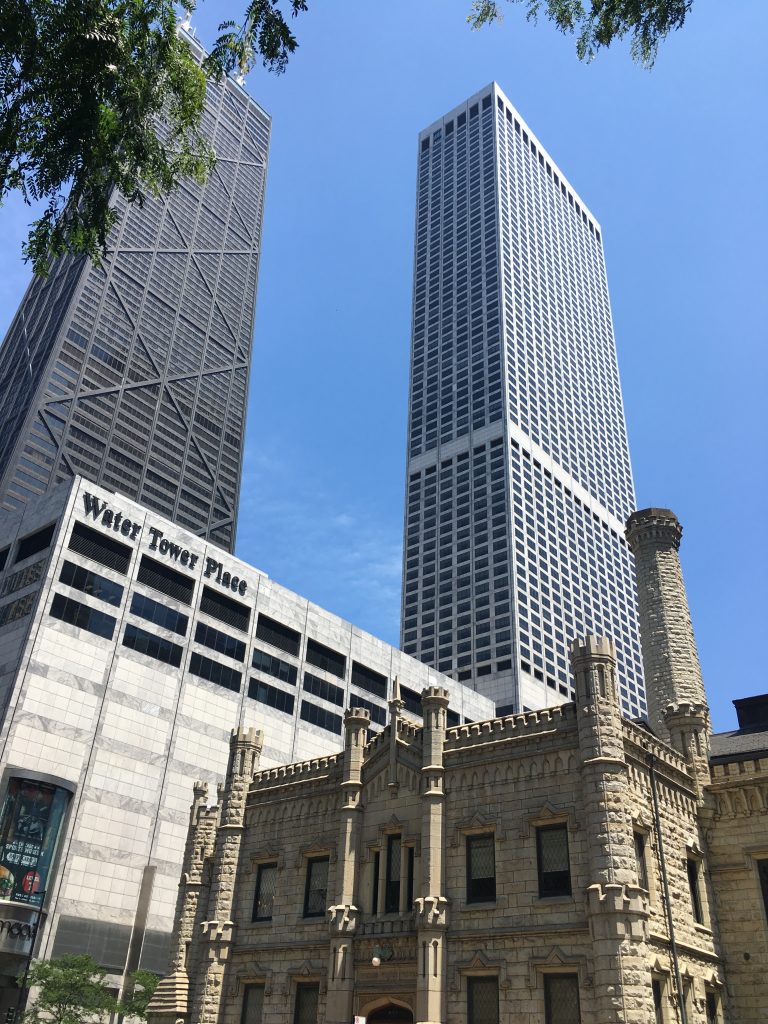 The Residence at Water Tower Place Condominium Association retained Elara Engineering to perform a holistic review of the building’s ventilation system to identify opportunities to improve performance, reduce energy consumption, and to improve occupant comfort. The following two-fold design approach reduced energy costs by 50% ($210,000 over the first eight months of operation) and improved occupant comfort through upgrade of the building’s central ventilation systems including reestablishing central humidification and improving building pressurization.
The Residence at Water Tower Place Condominium Association retained Elara Engineering to perform a holistic review of the building’s ventilation system to identify opportunities to improve performance, reduce energy consumption, and to improve occupant comfort. The following two-fold design approach reduced energy costs by 50% ($210,000 over the first eight months of operation) and improved occupant comfort through upgrade of the building’s central ventilation systems including reestablishing central humidification and improving building pressurization.
Intelligent Ventilation Control
Demand Controlled Ventilation (DCV) with dampers behind each condominium unit’s exhaust grille that open when exhaust is required (morning, evening) and close when not needed (mid-day, overnight) was utilized to:
- Reduce Fan Power to save significant energy,
- Improve Building Pressurization to reduce air and water infiltration, drafty conditions, and stack effect, and
- Reduce Makeup Air Volume to save significant energy.
Optimization of Makeup Air Unit Performance
Once the building’s exhaust and makeup air systems were operating intelligently, the Makeup Air Units (MAU) were improved by converting the ventilation system to an intelligently controlled demand oriented system, converting existing electric MAUs to gas, and adding three forms of heat recovery.
Elara Client Awarded $100,000 Solar Array Grant
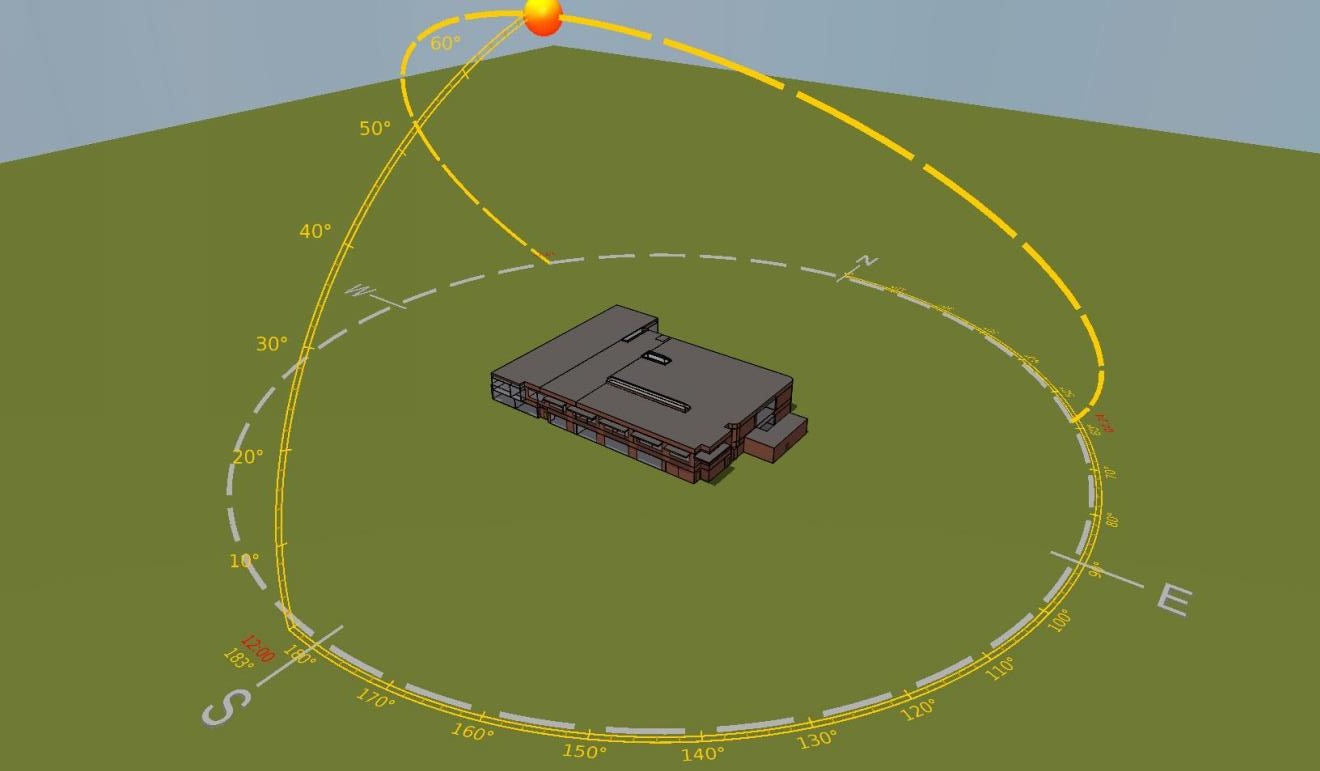 In collaboration with Indian Trails Public Library (ITPL) , Elara Engineering completed and submitted an EBSCO Industries, Inc. (EBSCO) Solar grant application to offset the installation costs of a solar panel array to further reduce the Library’s annual electricity expenditures. EBSCO received 90 submissions from 15 countries for the 2017 grant.
In collaboration with Indian Trails Public Library (ITPL) , Elara Engineering completed and submitted an EBSCO Industries, Inc. (EBSCO) Solar grant application to offset the installation costs of a solar panel array to further reduce the Library’s annual electricity expenditures. EBSCO received 90 submissions from 15 countries for the 2017 grant.
Elara’s energy modeling experts provided the following information and data for the grant application submittal:
- Computation of solar accommodating roof area according to calculated shade lengths of existing roof elements during winter solstice.
- Modeling and computation of panel inclination angle of highest photovoltaic efficiency.
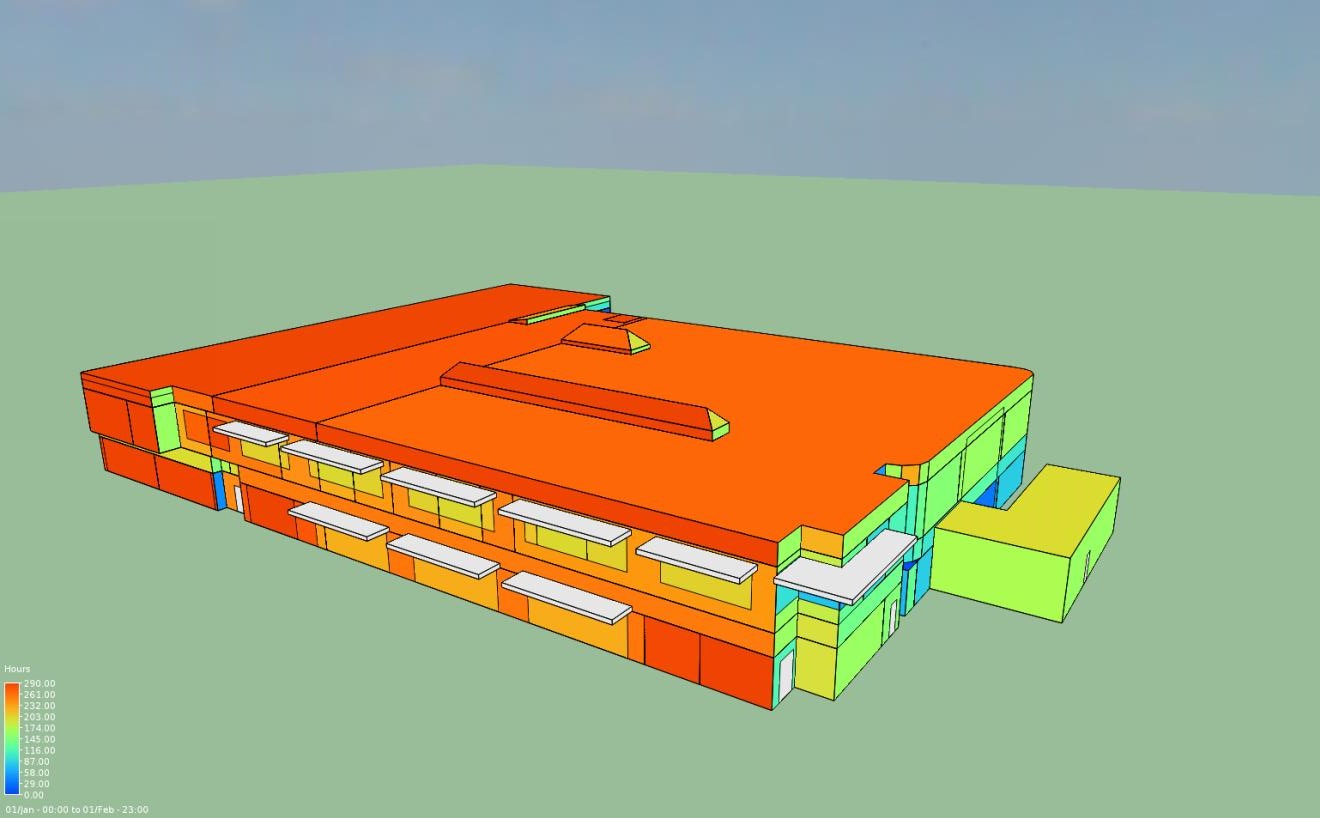
- Modeling of solar building performance, including thermal imaging of building exterior and solar inclination angles.
- Comprehensive schematic descriptions of sustainability projects already completed for the Library:Geothermal Heating and Cooling
- Energy Recovering Dedicated Outdoor Air Handling Units
- Variable Air Volume Terminals with Demand (occupancy sensing) Control and Automation
- LED Efficient Lighting
- Conversion of backup generators to natural gas.
- Review of local roofing and electrical building code requirements
Congratulations to Indian Trails Public Library for its ongoing dedication to environmental sustainability, including its strong commitment to the use of renewable energy sources.
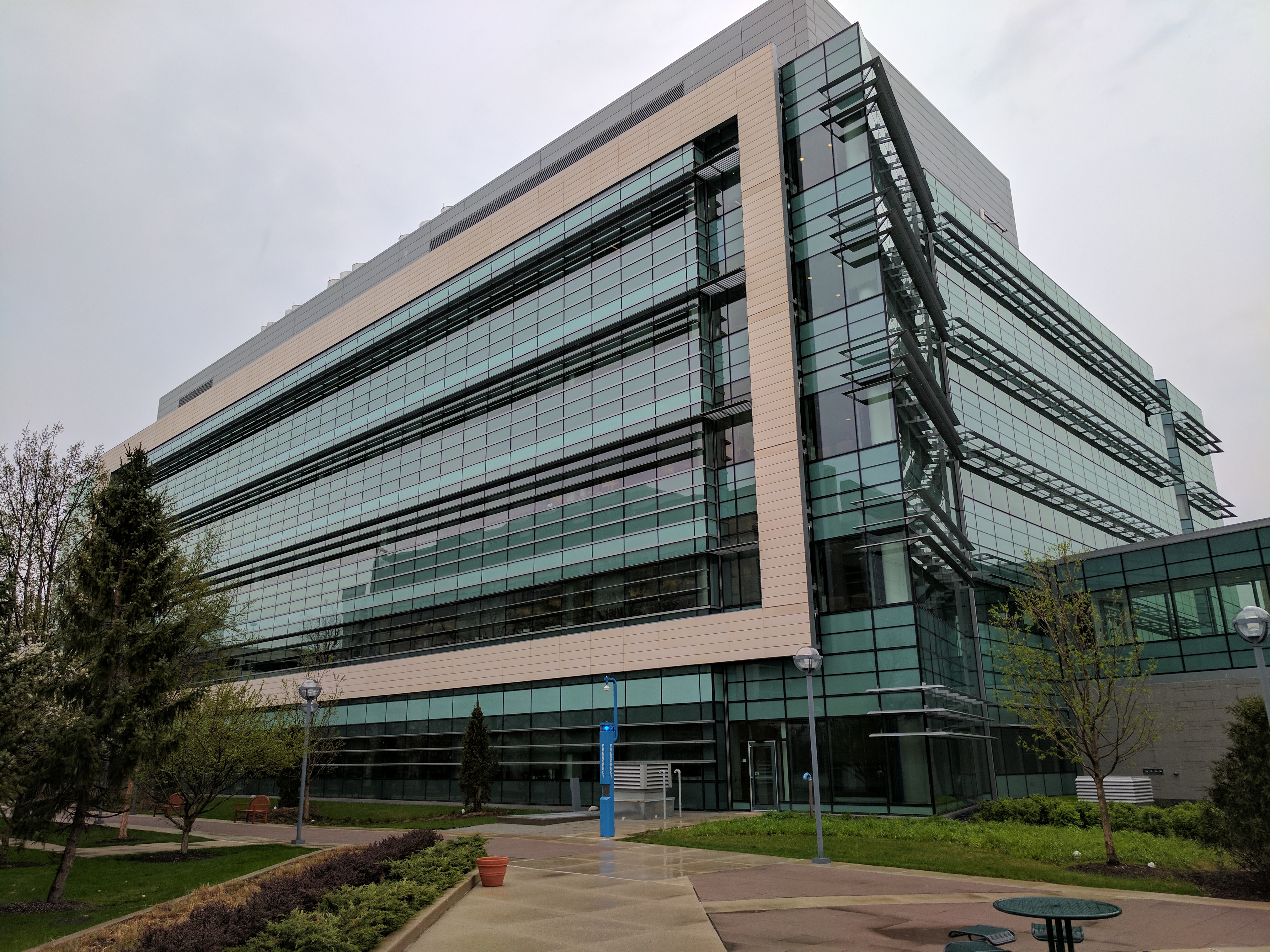 Elara's Enhanced Commissioning Supports LEED Gold Designation of State-of-the-Art Research Facility
Elara's Enhanced Commissioning Supports LEED Gold Designation of State-of-the-Art Research Facility
With LEED Enhanced Commissioning services and expertise, Elara successfully secured valuable points to ensure a highly desired LEED Gold designation for Loyola University's newly constructed Center for Transitional Research and Education facility (CTRE). The highly specialized, highly complex 5-story state-of-the-art research facility required an extreme level of systems redundancy and continuous mechanical system service to ensure uninterrupted medical research. To serve a wide range of space uses, the building included multiple sophisticated mechanical systems; including, emergency chilled water fed from the University's Health Science Campus and over 650 air terminal units.
Through coordinated commissioning activities that included comprehensive functional testing, the identification of control sequencing modifications and reliability enhancements -- considered to be of critical importance for lab space performance, and black out testing to verify emergency power functionality and emergency sequences for MEP systems throughout the building, Elara delivered a highly efficient building system with complete functionality.
Renovated Building and New Addition Uses 40-50% Less Energy
Elara Engineering recently completed a mechanical, electrical, plumbing and fire protection design for the renovation and expansion of Indian Trails Public Library in Wheeling, Illinois that is projected to result in a 40-50% reduction in energy use relative to other, typical library buildings. This sustained benefit was primarily derived from the innovative use of a geothermal heat pump heating and cooling system combined with energy efficient building materials and features.
The design team’s work addressed several issues impacting the original two-story building, including; substantial energy costs, poor indoor air quality, and outdated mechanical equipment. To correct this, the design team:
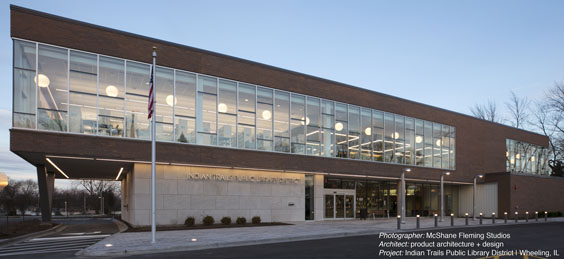
- Designed a new energy efficient mechanical system (geothermal heating/cooling heat pumps that generate hot and chilled water to serve fan coil units and VAV boxes within the occupied spaces) and digital controls for the new and renovated spaces
- Developed new power, lighting and emergency/egress lighting systems to support the new and renovated spaces
- Modified and expanded the existing fire alarm, plumbing and fire protection systems for the new and renovated spaces.
Elara Engineering Procures $164,685 in Incentive Funding for Chicago Client
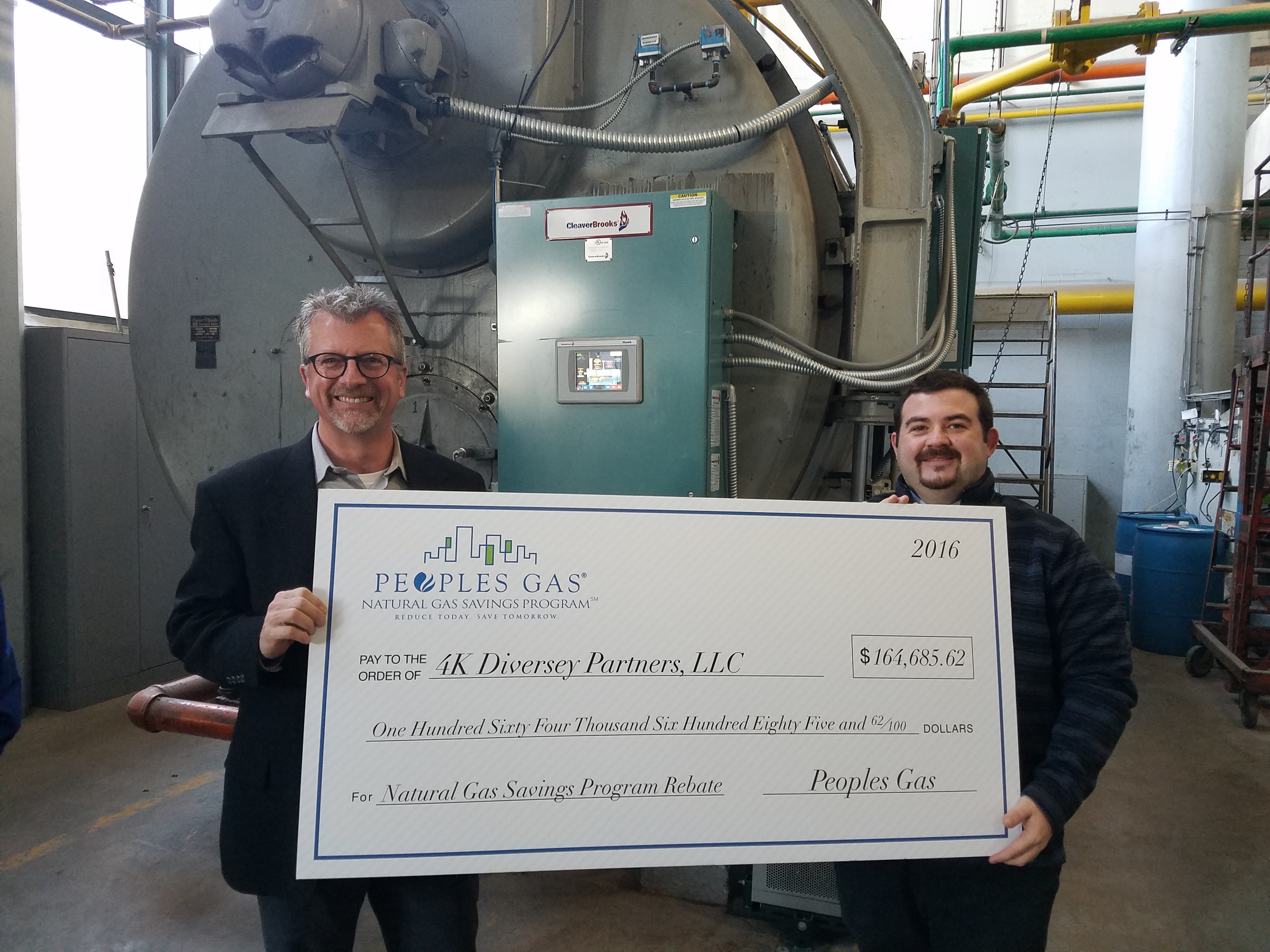 Identified in a Master Plan that Elara had developed for the owners of “The Fields” building at 4000 West Diversey Avenue in Chicago, Elara’s engineering team conceptualized and designed a demand controlled ventilation (DCV) system that provided $164,685 in incentive funding with an estimated $157,000 in annual energy cost savings.
Identified in a Master Plan that Elara had developed for the owners of “The Fields” building at 4000 West Diversey Avenue in Chicago, Elara’s engineering team conceptualized and designed a demand controlled ventilation (DCV) system that provided $164,685 in incentive funding with an estimated $157,000 in annual energy cost savings.
The DCV system for the 700-space indoor parking garage supports the conversion of the former Marshall Field & Company warehouse into a multi-use facility that includes high-tech loft live/work apartments, a grocery store, and loft style office spaces. This work, along with Elara’s specifications for new burner controls including linkage-less high-turndown burner retrofits for the building’s existing primary steam boiler, greatly improved energy efficiency, occupant comfort, and overall system reliability.
Elara Engineering Contributes to Successful Highland Park HS & Deerfield HS Renovation Project
“We could not have done this without a solid team. Many thanks to the Gilbane, Elara, Perkins + Will and all the contractors that worked on this project!!”
Daniel Mortensen, CPMM
Director of Facilities Management
Township High School District 113
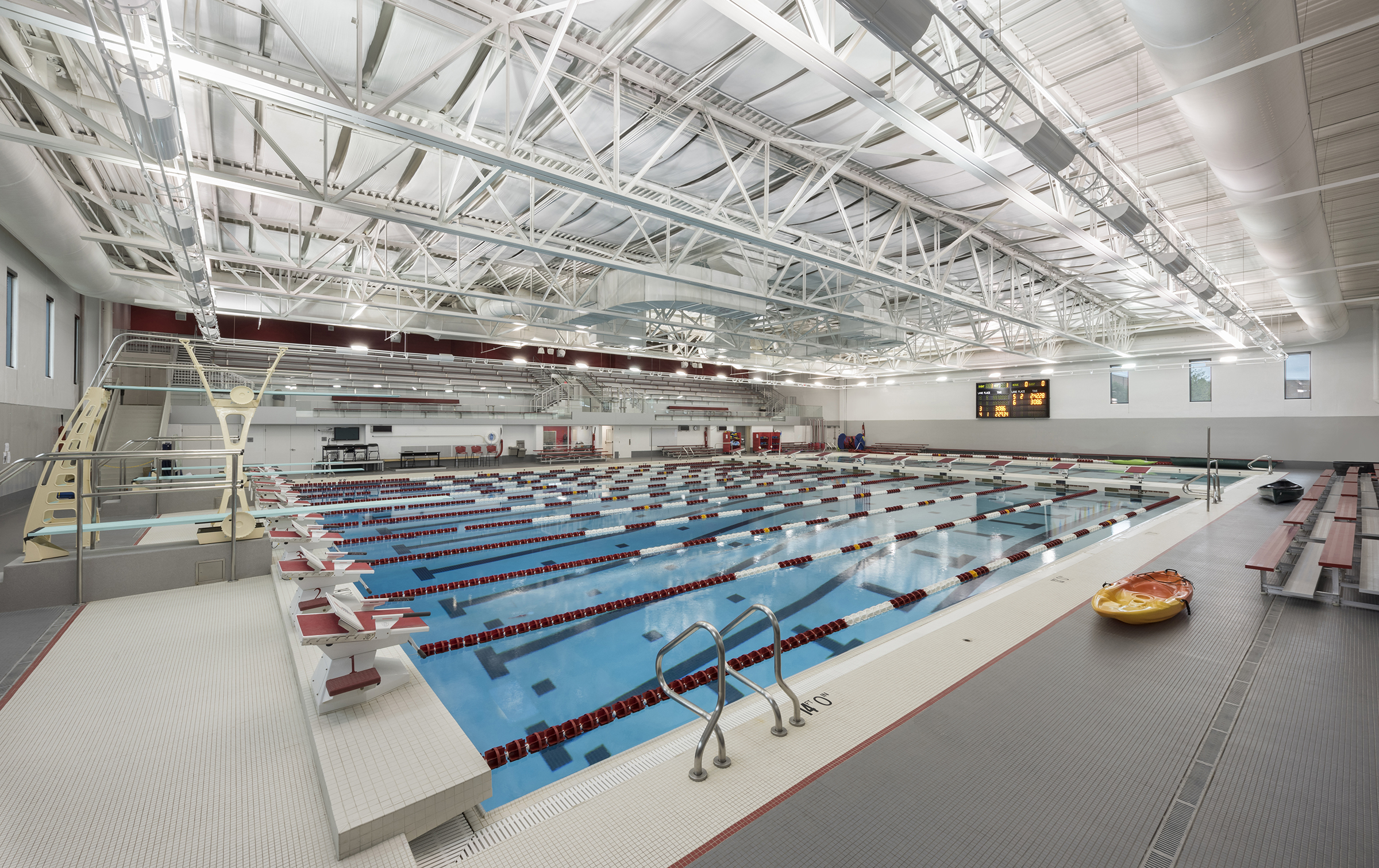
In a recent article in the Daily North Shore highlighting the work at the District’s Highland Park High School, Mr. Mortensen indicated that the most challenging part of the effort was the multi-year phasing of the project. “We wanted to ensure that the construction activities would not have a negative impact on the learning environment over the four years of ongoing construction.” He further stated that the four-year project is ahead of schedule. The project was initially targeted for completion in August of 2018. “The project is not closed out yet, but we are currently under budget and we’re anticipating it being 100 percent complete in August of 2017.”
Additional details about the Highland Park High School renovation project can be found in the Daily North Shore article at (https://jwcdaily.com/2017/03/13/hphs-unveils-21st-century-learning-renovations/).

